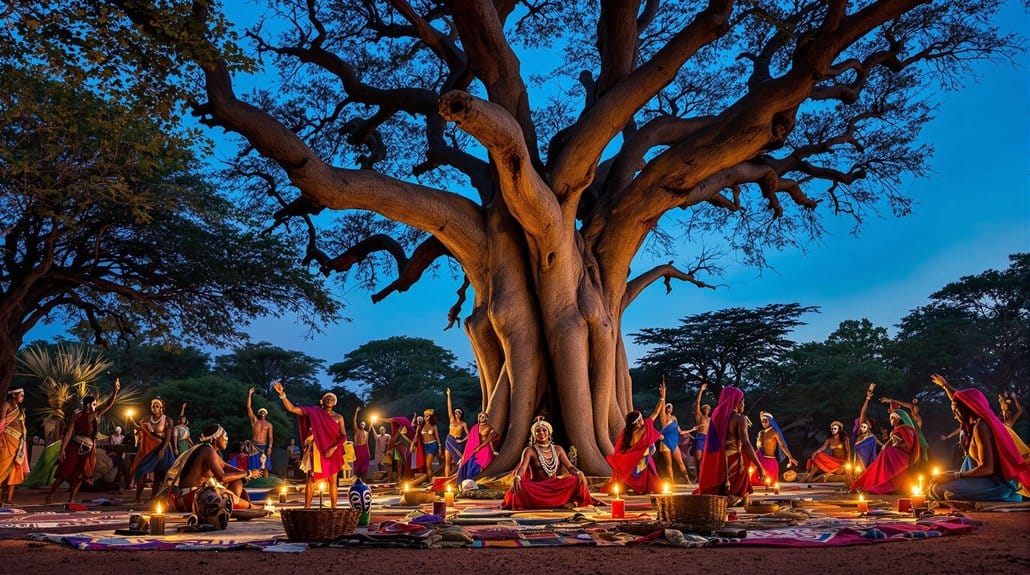African spirituality in cultural travel immerses you in a rich tapestry of beliefs, rituals, and ancestral connections. You'll encounter communities that honor their heritage through ceremonies, music, and dance, celebrating their relationship with nature and the divine. Spiritual journeys to sacred sites foster a deeper understanding of traditions and the roles of ancestors in daily life. You'll see how modern expressions merge ancient practices with contemporary culture, despite colonial disruptions. This journey enhances your appreciation for the vibrancy of African spiritual traditions, paving the way for meaningful experiences that connect you with the essence of the culture. There's much more to explore.
Key Takeaways
- African spirituality encompasses indigenous beliefs and practices, emphasizing connections to ancestors, nature, and the spiritual realm through rituals and community engagement.
- Cultural travel offers opportunities to participate in traditional ceremonies and rituals, fostering deeper connections with local communities and their spiritual heritage.
- Pilgrimages to sacred sites allow travelers to engage with ancestral veneration and participate in enriching cultural experiences that promote understanding and respect.
- Sustainable tourism practices prioritize the preservation of cultural heritage, ensuring that spiritual traditions are respected and maintained for future generations.
- The revival of African spiritual practices in contemporary travel highlights the resilience of these traditions and their adaptability to modern cultural exchanges.
Overview of African Spirituality
Often overlooked, African spirituality represents a rich tapestry of indigenous beliefs and practices that are deeply rooted in the continent's diverse cultures. Unlike many religions that rely on written texts, African spirituality thrives through oral traditions, where stories and teachings are passed down through generations. This dynamic form of indigenous religion emphasizes the connection between the physical and spiritual domains.
At the heart of African spirituality lies the belief in a supreme creator, complemented by various lesser deities and ancestral spirits. These entities greatly influence daily life and decision-making, guiding individuals through rituals and ceremonies that foster community cohesion.
You'll find that traditional beliefs and practices often incorporate elements of animism, where spirits inhabit natural objects and environments, reinforcing the sacredness of nature.
As interest in African spiritual practices resurges, particularly among the diaspora, you'll discover a deeper appreciation for cultural heritage. Engaging with these ancient beliefs can offer a sense of belonging, allowing you to connect with a rich history that resonates beyond geographical boundaries.
In this way, African spirituality becomes more than just a belief system; it's a pathway to understanding your place within a vibrant, interconnected world.
Key Beliefs and Practices
African spirituality encompasses a variety of key beliefs and practices that form the foundation of its rich cultural heritage. Central to this belief system is the recognition of a supreme creator, who's revered alongside ancestors who guide and influence the living. This connection guarantees a harmonious balance between the physical and spiritual domains, often achieved through traditional ceremonies.
These rituals involve music, dance, and offerings, creating a vibrant tapestry of community engagement and reverence. Oral tradition plays a significant role in preserving this spiritual knowledge, as stories are passed down through generations, weaving together cultural values and ancestral wisdom.
These narratives not only connect individuals to their roots but also foster a sense of belonging within the community. Many African spiritual practices also embrace animism, recognizing that spirits inhabit natural objects and landscapes, which are treated as sacred.
This interconnectedness extends to spiritual healing, where traditional medicine intertwines with spiritual guidance, emphasizing the mind-body-environment connection. By engaging in these practices, you're not just participating in a belief system; you're becoming part of a living, breathing legacy that celebrates the profound relationship between humanity and the divine.
Spiritual Journeys and Pilgrimages
Spiritual journeys and pilgrimages hold immense significance in African spirituality, offering profound opportunities for connection and reflection. These journeys often lead you to sacred sites, like ancestral shrines, which are crucial for maintaining ties with your ancestors and seeking their guidance.
As you participate in these spiritual excursions, you engage deeply with traditional African religions, where communal rituals foster a strong sense of belonging among fellow pilgrims.
Many of these pilgrimages coincide with annual festivals that celebrate deities or pivotal cultural events, drawing thousands to share collective spiritual experiences. It's more than just a journey; it's a vibrant tapestry of shared beliefs, where each step restores harmony between the physical and spiritual dimensions.
As you partake in offerings and ceremonies, you'll experience the interconnectedness of life that's central to African spiritual beliefs.
With the growing interest in spiritual tourism, many travelers are now rediscovering these traditional practices, seeking authentic experiences that deepen their understanding of African cultural heritage.
Cultural Significance of Ancestors
In many African cultures, ancestors play an essential role in guiding your choices and shaping your community's values.
You'll find that rituals and offerings at ancestral shrines aren't just traditions; they're lifelines to wisdom and protection that help maintain harmony between the living and the spirit world.
Ancestral Guidance Importance
While many cultures around the world honor their ancestors, few places emphasize their guidance and protection as profoundly as within African traditions. Here, ancestors aren't just revered; they're woven into the very fabric of daily life, acting as crucial sources of support and blessings.
You'll notice that maintaining ancestral shrines is considered essential for communal wellbeing, as these sacred spaces facilitate communication with ancestral spirits who influence your fortunes.
Ancestral guidance isn't merely a personal affair; it echoes the importance of community. The wisdom and experiences of ancestors shape cultural values, fostering a sense of belonging that transcends generations. Engaging in rituals and ceremonies reinforces familial bonds, ensuring that collective memories endure and thrive.
Even in contemporary Africa, where Christianity and Islam hold sway, many still honor indigenous ancestral beliefs, showcasing a vibrant tapestry of tradition.
You'll find that these practices help you connect with your roots, reminding you of the resilience and strength found within your community. Embracing these ancestral connections allows you to navigate life with a sense of purpose, knowing that you're supported by a lineage that cares for you.
Rituals and Offerings
Engaging with ancestors through rituals and offerings forms a cornerstone of African spirituality, highlighting their enduring influence on both personal and communal life. These rituals serve as a bridge between the living and the spiritual dimension, allowing you to cultivate a profound connection with your ancestors. By honoring them through offerings of food, drink, and symbolic items, you express gratitude and respect, reinforcing the belief that their guidance shapes your fortune.
The act of maintaining ancestral shrines becomes essential, as these spaces symbolize the ongoing relationship between the community and its forebears. Significant life events—like births, marriages, and funerals—often prompt these rituals, underscoring their role in marking changes and celebrating shared heritage.
Participating in these practices fosters a sense of belonging, as you connect with others who share similar beliefs. Oral traditions further enrich this cultural tapestry, passing down stories that reinforce the values of ancestor veneration.
Rituals and Ceremonies
Rituals and ceremonies in African spirituality offer a vibrant tapestry that connects individuals to their cultural heritage and the spiritual sphere. These practices are pivotal in maintaining harmony between the physical and spiritual worlds, often inviting community participation and honoring ancestors.
You'll find that each ritual is a celebration of life and a way to engage with the unseen forces that shape existence.
Consider the following aspects of rituals and ceremonies:
- Ancestral offerings: These serve as a bridge to the past, invoking blessings and guidance from those who came before you.
- Cultural expression: Music, dance, and storytelling intertwine, fostering a rich environment for sharing wisdom across generations.
- Community bonds: Events like initiation rites and harvest festivals strengthen social ties, reinforcing a sense of belonging and identity.
Through traditional medicine and spiritual healing, rituals emphasize a holistic connection between mind, body, and spirit.
Each ceremony you witness becomes a reminder of the collective memory, offering you a deeper understanding of the cultural landscape and the profound respect for ancestors that permeates African spirituality.
Engaging in these practices enriches your journey into this remarkable domain.
Syncretism in African Religions
In the rich landscape of African spirituality, syncretism emerges as a dynamic interplay between indigenous beliefs and major world religions, creating a unique tapestry of spiritual practices that resonate with local customs and values. You can see this blend in various forms, where African traditions harmoniously integrate with faiths like Christianity and Islam.
| Religion | Syncretic Elements |
|---|---|
| Voodoo | Fusion of West African Vodun and Catholicism |
| Santería | Worship of Orishas equated with Catholic saints |
| Palo Mayombe | Combination of Bantu traditions with Catholicism |
The Yoruba religion, often referred to as Isese or Ifa, exemplifies this syncretism beautifully. It incorporates the belief in Olodumare, the supreme god, alongside the worship of Orishas, showcasing how indigenous African spirituality adapts and thrives in diverse contexts. This blending not only preserves cultural identity but also invites a sense of belonging within a global spiritual community. Embracing these practices allows you to appreciate the rich heritage and interconnectedness that define African spiritual life.
Impact of Colonialism on Spirituality
Colonialism drastically disrupted indigenous African spiritual practices, pushing traditional beliefs to the margins in favor of foreign religions like Christianity and Islam.
Yet, you'll find that many communities displayed remarkable resilience, adapting their spiritual practices and blending them with these new faiths.
This ongoing struggle for identity not only highlights the impact of colonialism but also underscores a revitalization of interest in reclaiming cultural heritage today.
Disruption of Indigenous Practices
While many African communities once thrived on rich spiritual traditions, the arrival of foreign powers marked a significant turning point that disrupted these indigenous practices. Colonialism imposed foreign religions like Christianity and Islam, leading to a decline in traditional beliefs and rituals. This disruption wasn't merely a shift in faith; it was a profound upheaval that reshaped cultural identities.
The impacts of colonialism are evident in several key areas:
- Indigenous practices were often labeled as "pagan" or "savage," resulting in the suppression of local customs.
- Ancestral veneration and traditional healing methods faced significant obstacles, leading to a loss of cultural continuity.
- The slave trade forcibly removed millions from their homelands, further eroding spiritual heritage.
As a result, communities struggled to maintain their unique belief systems in the face of oppression.
Yet, despite these challenges, there's a growing movement today to reconnect with these ancestral traditions. Many Africans are once again embracing their indigenous spirituality, seeking to reclaim their rich heritage and affirm their identities amidst global influences.
This journey towards rediscovery is essential for fostering a sense of belonging in a rapidly changing world.
Resilience and Adaptation Strategies
The impact of colonialism on African spirituality has led to remarkable resilience and adaptation among communities working to preserve their cultural identities. Though traditional practices faced significant disruption, many Africans today find ways to integrate their indigenous beliefs within Christianity or Islam, demonstrating an enduring connection to their African traditional roots. This blending reflects a powerful resilience, as individuals seek cultural continuity amid external influences.
Moreover, the slave trade inadvertently facilitated the global spread of African religions, leading to new forms like Vodou and Candomblé that echo core elements of original belief systems. These adaptations highlight the dynamic nature of spirituality, showcasing how it evolves while retaining deep cultural significance.
In recent years, there's been a resurgence of interest in traditional African religions. This revival is a reflection of communities reclaiming their heritage, often through vibrant gatherings and educational initiatives.
These efforts not only celebrate ancestral practices but also forge a collective identity in post-colonial contexts. By embracing both their past and present, individuals strengthen their sense of belonging, ensuring that the spirit of African spirituality continues to thrive against the backdrop of history.
Modern Expressions of African Spirituality
Modern expressions of African spirituality vividly illustrate the dynamic interplay between ancient traditions and contemporary life.
You'll notice how African traditional beliefs blend seamlessly with modern practices, creating vibrant syncretic religions like Vodou in Haiti and Santería in Cuba. These spiritual paths incorporate elements of Catholicism while honoring indigenous African cultures, showcasing the adaptability of faith.
Some key features of modern African spirituality include:
- Revival of Rituals: There's a growing interest among the African diaspora in traditional practices, leading to community gatherings and ceremonies that celebrate cultural heritage.
- Global Influence: Yoruba traditions have notably impacted religions like Candomblé in Brazil and Umbanda, where practitioners maintain ties to their African roots while adapting to their local environments.
- Cultural Appreciation: Efforts to recognize and understand African spiritual traditions have increased, enriching contemporary cultural narratives worldwide.
As you engage with these expressions, you'll find a deep sense of belonging and connection, reflecting the resilience and richness of African culture across diverse settings.
These modern interpretations reaffirm the importance of community and identity in a rapidly changing world.
Role of Art and Music
Art and music are vibrant threads woven into the fabric of African spirituality, serving as powerful conduits for expression and connection. You'll find that artistic expressions, such as intricate beadwork, textiles, and carvings, aren't merely decorative; they tell stories that shape cultural identity and invoke the essence of community.
These creations reflect themes of nature, ancestors, and deities, illustrating the deep interconnectedness of life within African belief systems.
Music plays an equally essential role, where traditional drumming, singing, and dancing become fundamental in rituals and ceremonies. These rhythmic elements help bridge the physical and spiritual dimensions, often acting as spiritual healing tools.
Specific rhythms and chants are believed to invoke ancestral spirits, promoting emotional and physical well-being among community members.
During vibrant festivals, you'll witness how dance and music come alive, enriching cultural heritage and fostering community engagement.
These performances not only celebrate African spirituality but also attract tourism, inviting others to experience the profound connections woven through art and music.
Through these expressions, you'll feel a sense of belonging and appreciation for the rich tapestry of African culture.
Future of African Spiritual Travel
As interest in cultural and spiritual experiences surges, the future of African spiritual travel stands poised for remarkable growth. You'll find that the rising demand for authentic encounters is intertwined with a resurgence in African traditional religion, especially among the diaspora. Travelers like you're increasingly seeking connections that honor cultural heritage and foster a sense of belonging.
Consider these key trends shaping this future:
- Sustainable tourism: Emphasizing the conservation of cultural heritage while promoting community involvement is essential for genuine experiences.
- Interdisciplinary studies: New research avenues combining tourism and African spirituality will uncover deeper insights and enrich your travel experience.
- Local engagement: Integrating local customs and rituals into travel itineraries allows for meaningful connections with cultural identities.
In this evolving landscape, African spiritual travel isn't just about visiting destinations; it's about embracing experiences that resonate with your spirit.
As you explore, you'll contribute to preserving these rich traditions, ensuring that they thrive for future generations. Together, we can celebrate the profound beauty of African spirituality while fostering a sense of community and understanding.
Frequently Asked Questions
What Is Meant by African Spirituality?
African spirituality embodies a rich tapestry of beliefs rooted in African cosmology, where you find a deep reverence for ancestors who guide and protect your lineage.
This spirituality thrives through ritual practices that connect you to the natural world and the unseen forces around you.
It's about community, where shared experiences foster belonging, and understanding that your identity is intertwined with ancestral wisdom and the sacredness of life itself.
What Are African Spiritual Concepts?
Imagine standing beneath a vast sky, feeling the pulse of the earth beneath your feet.
African spiritual concepts weave together ancestor worship, where you honor those who came before, and nature reverence, recognizing the spirits in every tree and river.
Community rituals bring people together, celebrating life and fostering connections.
These practices aren't just beliefs; they're lifelines, binding you to your roots and reminding you that you're part of something greater.
What Is One Common Element of Most African Spiritual Traditions?
One common element of most African spiritual traditions is ancestor reverence.
You'll find that honoring ancestors creates a strong community connection, fostering a sense of belonging. These practices carry ritual significance, intertwining daily life with spiritual beliefs.
When you participate in ceremonies honoring your forebears, you not only seek guidance but also reinforce your ties to your heritage. This deep respect for lineage enriches your understanding of both the past and present.
What Are the Different Types of African Spirituality?
When exploring the different types of African spirituality, you'll encounter rich traditions emphasizing ancestral worship, nature spirits, and healing rituals.
Each culture offers unique practices, connecting you to the past and community. You'll find that ancestral worship fosters a deep respect for lineage, while nature spirits embody the essence of the environment.
Healing rituals, often communal, invite participation and create a strong sense of belonging, allowing you to engage with these vibrant spiritual legacies.
Conclusion
As you explore African spirituality, you'll discover that over 90% of Africans identify with traditional beliefs alongside major religions. This rich tapestry of faith shapes cultural identities and community bonds. Engaging in spiritual journeys, rituals, and artistic expressions, you'll experience the profound connection to ancestors and nature. Understanding these practices not only enhances your travel experience but also fosters a deeper appreciation for the resilience and vibrancy of African cultures, paving the way for meaningful connections.








